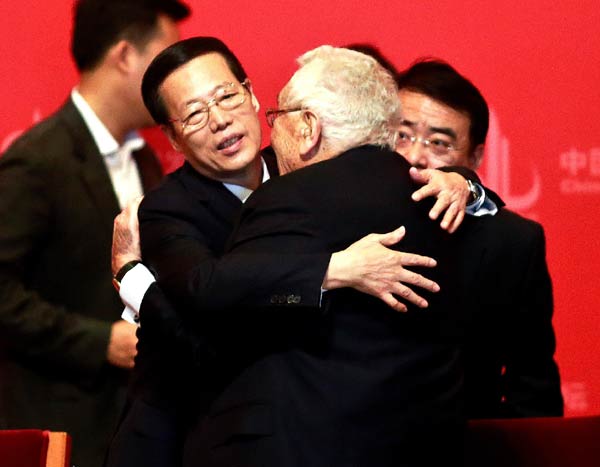
Liberalization of trade, investment will build a more equitable economy
 |
|
Vice-Premier Zhang Gaoli (left) greets former US secretary of state Henry Kissinger with a hug at the China Development Forum 2015 in Beijing on Sunday. [FENG YONGBIN/CHINA DAILY] |
The Chinese economy will provide "more rather than fewer" chances for the development of other countries against the backdrop of the new normal, Vice-Premier Zhang Gaoli said at the China Development Forum 2015 on Sunday.
China will treat domestic and foreign firms equally in anti-monopoly law enforcement and other issues to build a "stable, fair, transparent and predictable" business environment, said Zhang.
The country is promoting trade and investment liberalization and facilitation and will work with other countries to build a more "equitable and reasonable" world economic order, he said.
Chinese foreign trade exceeded $4.3 trillion and the country's outbound foreign direct investment reached $102.9 billion last year.
Zhang said the country will revise laws and regulations governing foreign investment and introduce a new regime specifying areas where foreign capital is banned or limited.
China will do a good job in building its Free Trade Zones in Shanghai, Guangdong, Tianjin and Fujian and establish "high-level" free trade areas with other countries.
Commerce Minister Gao Hucheng said at the forum that in the next five years China aims to increase the share of its imports and exports of goods that go through free trade agreements to half of the total, up from the current 30 percent.
The country has signed draft free trade agreements with South Korea and Australia in recent months, and Gao said official agreements with those two countries are "expected to be signed soon".
China is negotiating and carrying out feasibility studies on similar free trade agreements with more countries and regions in South Asia, Central Asia and West Asia, under the "One Belt and One Road" framework, he said.
The minister said one of his ministry's priorities this year is to step up efforts to promulgate the new foreign investment law. China will further ease restrictions on foreign investors, particularly in the high-end manufacturing and service sectors.
China's antitrust law enforcement is also an issue that creates doubt among foreign investors about whether they have been put on the same legal footing as domestic firms, although officials said only 10 percent of the companies involved in antitrust probes were foreign companies.
"The Chinese economy is undergoing restructuring and the role of the market needs to be further emphasized. Implementation of the antitrust law is important in safeguarding fair competition," Zhang Handong, new head of the price-supervision and anti-monopoly bureau under the National Development and Reform Commission, said at a seminar in Beijing on Saturday.
Meanwhile, the country will further optimize law enforcement procedures on the basis of its experience in the six years since the law came into effect, said Zhang.
"China's antitrust law enforcement has been criticized a lot by commentators when it touches the interests of foreign firms operating in China," said Jessica Su, antitrust scholar and Institute of American Studies associate professor at the Chinese Academy of Social Sciences.
"However, the regulators' investigation of monopolistic behavior and implementation of the law has a clear legal basis and is rooted in objective facts," said Su.
Zhong Nan contributed to this story.








